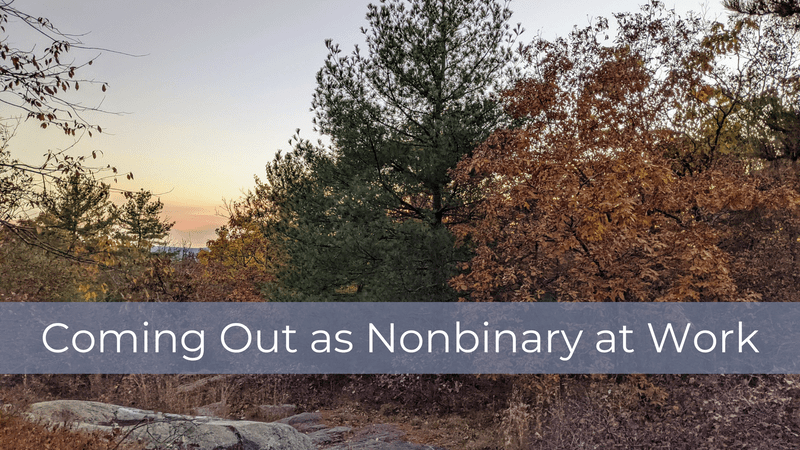“Why don’t you ask your coworkers to use they/them pronouns for you?” the leader of the trans support group asked me. I asked the support group to use they/them pronouns for me, but I was uncomfortable voicing that preference at work. My coworkers at the time all used she/her for me. I didn’t want them to see me as different, picky, or unprofessional. Coming out as nonbinary at work was intimidating.
I had a clear cut case of internalised transphobia. I was not willing to stick up for my own identity at work in the way I would for any of my friends.
Hi, I’m Rey, a nonbinary writer! Please subscribe for more stories and resources:

The first time I worked with someone who used they/them pronouns, I met them remotely first. In a company all-hands meeting before they visited the office to work in person for a few weeks, the CTO announced to everyone, “Kris* is great. We like Kris. As you know, Kris uses they/them pronouns and I need you to refer to them correctly. Don’t mess it up.”
*Name changed
That announcement changed my life. I learned that excellent leadership means supporting your employees’ identities in ways that are meaningful to them. Real professionalism isn’t pretending you are okay with the wrong pronouns to make your team more comfortable. Professionalism is communicating clearly how others can be respectful when referring to you, and for leadership, making it clear that showing respect in the workplace is important.
It took me time to come out as nonbinary at work. Months, even at an inclusive and diverse company that gave every indication they would support me.
Not interested in womens-only events
Some of my coworkers invited me to womens-only events such as Employee Resource Group meetings and after-work get togethers at a local bar. I rather awkwardly declined, not giving a good reason. I felt bad about the looks of disappointment, puzzlement, or confusion I received. I tried to toe the line of expressing support without actually joining the meetings.

Photo by Tima Miroshnichenko from Pexels
Non binary in the workplace
I came out as nonbinary to the leadership at my job before coming out to a lot of my friends or other peers. I wanted to know if I was going to receive rejection or support from the people who could provide direction to the rest of the company. This required a level of trust and a guess that it was going to go over okay.
Before coming out at work for the first time, I reviewed the employee handbook and confirmed that it stated “gender identity and gender expression” were both protected. I was on good terms with our HR professional who I trusted a great deal. And I knew the company where I worked was progressive and trying its best to be inclusive. This is not the case for a lot of workplaces. If your workplace or coworkers are hostile towards you coming out, there are legal protections that you can explore. But even in an environment I guessed would support me, I was still terrified and avoidant.
You don’t owe anyone your full self at work
People you work with, at a baseline, need to know how to interface with you. That means they need to know what name to call you, what pronouns to use, and any language that’s acceptable or not acceptable (gendered terms, for example). That’s it. Coworkers are not entitled to any information about your medical history, internal identity, family, friends, what you do or wear when you’re outside the workplace, etc.
It’s more than okay to set boundaries around your professional self and only share as much or as little as you want to share with coworkers and management.
If you have work friends who you choose to share more with, that’s great. But it’s not required.

Photo by Alena Shekhovtcova from Pexels
Changing name at work
I applied for my job under my new name, before I legally changed my name. My resume, email address, mailing address and all communications used my new name consistently. My offer letter which I signed had my new name on it as well. I believe this is all valid under a common law name change (although I am not a lawyer and cannot give legal advice).
At the point which my contact reached out to do a background check and have me sign a W-9, I explained that my legal name was different from the name I commonly use. I provided my legal name for the forms. I asked that my new name be used for my email address and in any introductions at the company.
About a year later, I obtained a court order and started the process of changing my legal name on my identification. When I received my new passport, I asked the company to update my legal name in their paperwork, for payroll, taxes, etc.
I did my taxes under whatever name was on my W-2 form that year. After my legal name was changed with my employer, I could file taxes under my new name.
Changing pronouns at work
I’ve been lucky enough to have a series of excellent managers, who each asked me what pronouns they should use for me (they were probably guessing based on being aware I was nonbinary). I asked them to use they/them pronouns for me, and for the most part, they have. It makes a huge difference when my direct manager consistently uses my pronouns. I feel supported, respected, and comfortable in my job.
I put my pronouns in my email signature, Slack bio, and Zoom name, and didn’t correct anyone if they used the wrong pronouns for me. A few coworkers reached out to me privately to apologize for using the wrong pronouns. They meant well, but it’s not my favorite thing to try to field overly upset apologies.
Especially with working remotely on video and voice calls, it’s extremely difficult for me to interject a quick “they” to correct someone’s sentence referring to me as I might do real-time in person. I basically end up never correcting anyone, which is a personal choice I’ve made and stand behind. I feel like it would be more accurate to describe my pronouns as they/he/she in descending order of preference, but if I did that, I suspect no one would use “they.”

Photo by Los Muertos Crew from Pexels
Speaking to clients
I talk to a lot of customers and new people for my job, and generally, third-person pronouns don’t come up referring to me that often. If a customer uses “she” for me, it feels mildly uncomfortable but I move on and try to do my job as best I can. I enjoy talking to new people, actually, and feel proud that I can be a public-facing nonbinary employee of my company.
I was questioned by my manager when I accepted a customer-facing role whether I would be okay speaking to people from different cultures and countries who might not be familiar with they/them pronouns. I assured this person that I would be good with taking on this position. I’ve found that actually, Americans are just as bad at using they/them pronouns as people from other countries, maybe worse.
Not correcting people on my pronouns is my own personal preference, and I highly support others making the choices that make them feel comfortable at work and in their lives. If you feel better after letting people know how to refer to you respectfully and correctly, absolutely do that! You can also ask a coworker to help you out and talk to someone who is not using the correct pronouns for you. I would certainly do that for someone at my workplace.
Nonbinary as a manager
In my role as a manager or team lead, I am open with my team about my pronouns (in email signature, etc). I don’t correct anyone who reports to me if they accidentally use the wrong pronoun for me. If someone went out of their way to refer to me incorrectly, intentionally, frequently, or in a harassing way, I would have a private conversation to try to understand and address that issue. Luckily, I have not faced this situation.

Coming out as non binary at a new job
Your resume or LinkedIn profile may be a company’s first impression of you (if you don’t walk in in person to interview). I am more comfortable working with people and organizations that understand and accept I am nonbinary and use they/them pronouns. I choose to make my identity fairly clear when reaching out for new work opportunities (such as putting my pronouns in my email signature or in my LinkedIn profile).
Joining a new company after transitioning can sometimes be easier than changing people’s expectations of you at an existing job. (But that’s not impossible).
Just like before coming out at an existing job, I would recommend doing a little research to determine how inclusive and supportive of LGBTQ rights your new or prospective company is. You could review the employee handbook, see if they have comments about supporting diversity on their website, ask if they have Employee Resource Groups, or ask if anyone at the organization uses they/them pronouns.
As a freelance contractor, at this point in my career I would mention on my website and promotional materials that I am an advocate for the LGBTQ community, that I am nonbinary, and use they/them pronouns. I’m willing to piss off a few prospective customers in favor of working with people I really want to support with my labor.
Based on the way I look, many people read me as a woman. This gives me the choice whether to disclose my trans identity. Some people do not have this choice. I want to acknowledge my privilege in being able to make this choice in what to share with others. On the flip side, it means very few people will be able to interpret my gender identity from my appearance.

Photo by Marcus Aurelius from Pexels
Non binary coworker
Can I just say I was so excited the first time I worked with a nonbinary coworker?? I wasn’t out myself at the time but I was delighted and inspired to see someone else expressing their identity and supported by our community in this way. It’s strange to think I might be this person for someone else some day, because I’ve done the work to speak my truth in the workplace.
I try to support trans and nonbinary people in my workplace, whether or not they are out publically. Sharing my pronouns and using gender-neutral language is a good way to do this. Don’t say “thank you, ladies!” or the word “sir” in a work meeting, okay! It’s not polite, it’s weirdly gender-y. Thanks. Linking to articles and media that are pro-trans-rights, if your company shares stuff like this.
If you are nonbinary and contemplating coming out at work, I encourage you whether or not you decide to share this part of yourself with your coworkers! It’s okay to do whatever feels most comfortable in your specific work environment. If you work at a toxic company, perhaps finding a different employment opportunity is a higher priority than trying to figure out how to safely come out. But if you do work at a place that is moderately supportive, even though it can still be scary to come out, I have found it’s been much more comfortable for me to express myself in the long term. It’s one layer of masking that I can take off. I appreciate that my job offers me the opportunity to speak accurately about myself and express who I am. I want that opportunity for everyone!
